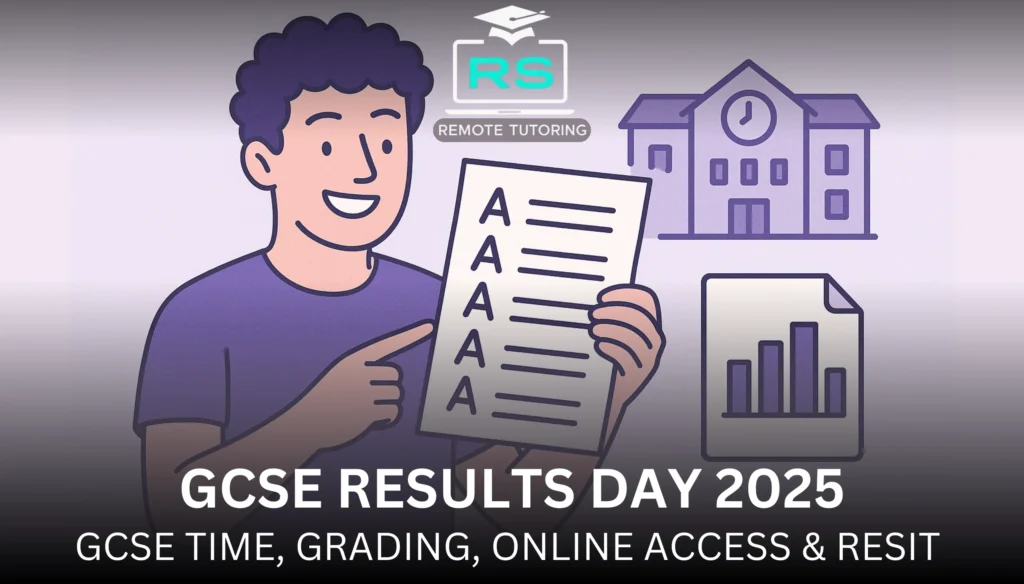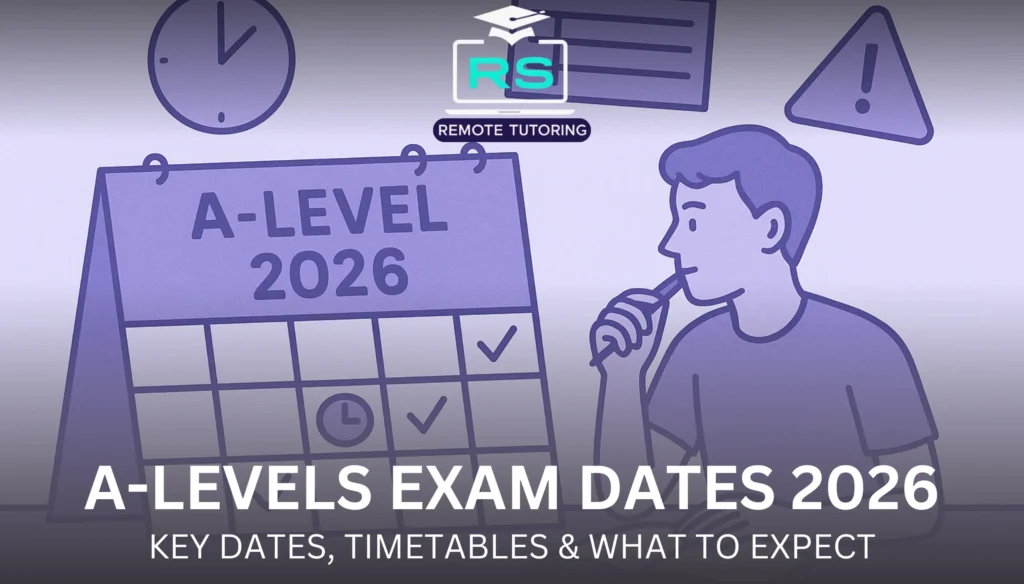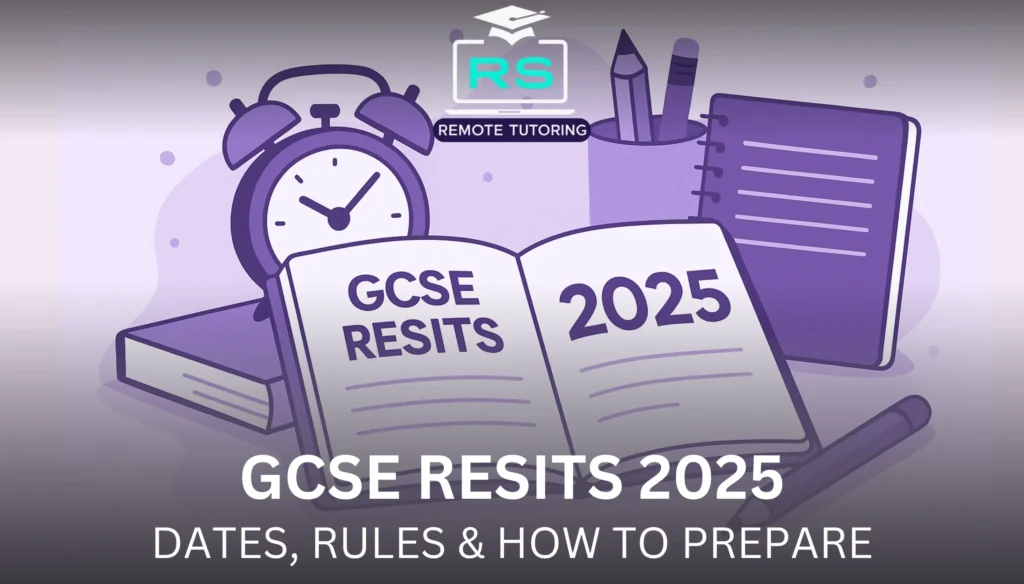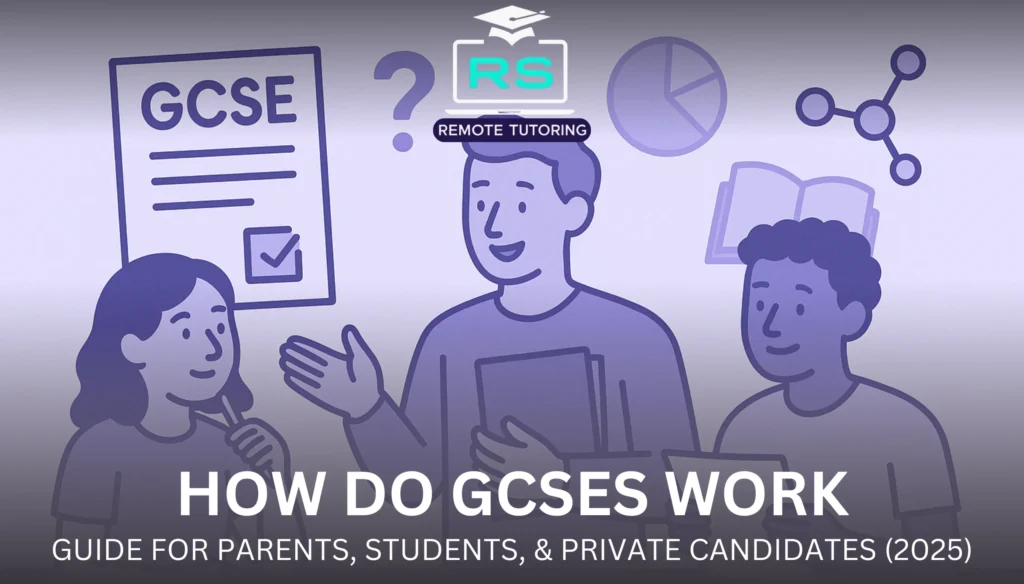Whether your child is preparing for the 2026 GCSEs or looking to catch up after an unexpected result, one of the first questions you’ll face is how much to budget for a GCSE tutor. With hourly rates ranging from £15 up to £60 and beyond, it’s easy to feel lost. This guide breaks down the cost of GCSE tutoring, explains the factors that determine price, and helps you decide how to invest wisely in your child’s education. As an online tuition provider, we also outline our own transparent pricing plans and why they offer great value.
Jump to Section
Why Invest in GCSE Tuition?
GCSEs play a pivotal role in a young person’s academic journey. They act as a gateway to sixth‑form colleges, apprenticeships and even university applications. Strong grades in English, mathematics and science are particularly important. But beyond grades, personalised tuition can provide.
- Boosted confidence and motivation: One‑to‑one attention helps students tackle topics they find difficult and gain reassurance from a supportive expert.
- Structured revision: A tutor can design a study plan tailored to your child’s strengths, weaknesses and learning style, ensuring no topic is missed.
- Improved exam technique: Examiners’ expectations can be confusing. Tutors teach how to interpret questions correctly and structure answers for maximum marks, reducing the risk of common mistakes.
- Accountability: Regular sessions keep students on track, preventing last‑minute cramming and encouraging steady progress.
While GCSE tuition isn’t the only route to success, many families find it a worthwhile investment especially when combined with self‑study and school lessons. The next step is understanding what that investment might cost.
Average UK Tutor Rates
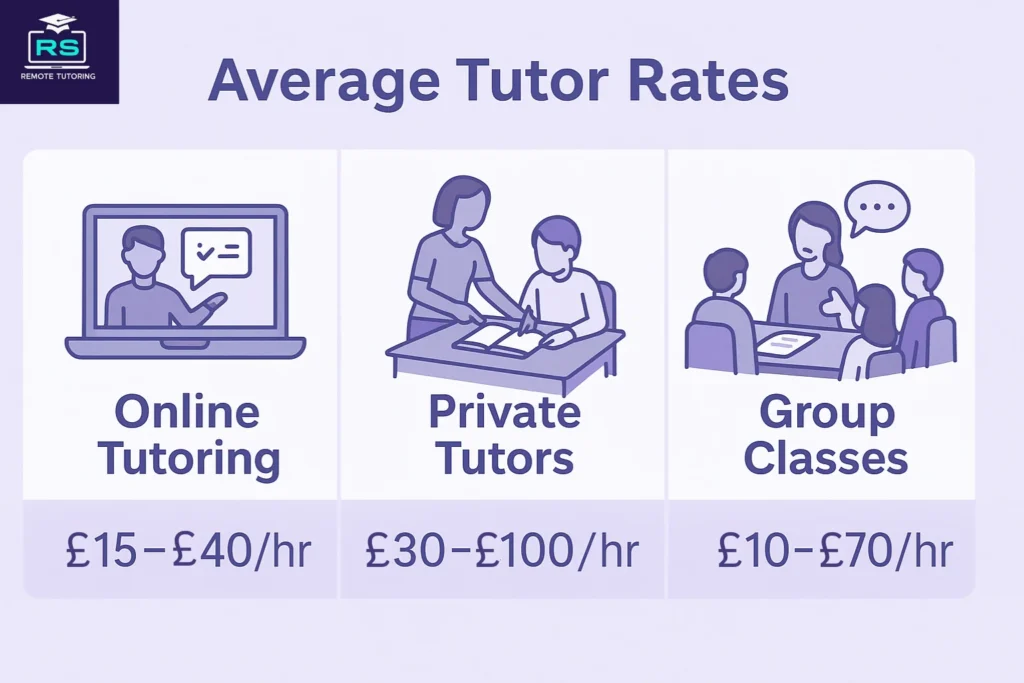
Most parents have heard anecdotal figures about tutoring costs. To set realistic expectations, let’s look at typical UK prices. According to educational research and tutoring providers, the average hourly cost of a GCSE tutor is around £39 for face‑to‑face lessons and £31 for online sessions. However, the range is wide:
- Entry‑level tutors or undergraduates: £10–£30 per hour. They may be studying a related subject themselves and offer a lower rate while building experience.
- Qualified teachers and specialised professionals: £30–£100 per hour. They bring classroom expertise, exam‑board knowledge and often hold postgraduate qualifications.
- Subject specialists (e.g. Mandarin or physics): Some niche subjects command even higher rates, averaging over £70 per hour.
- Private tuition agencies: Companies may charge £20–£40 per hour plus a one‑off fee or subscription.
- Online tuition platforms: Typically £15–£40 per hour, reflecting savings on travel and venue.
- Small group lessons: £10–£70 per hour per student, offering a more affordable alternative while retaining interaction.
It’s clear there’s no fixed “right” amount. Instead, your budget should reflect the tutor’s qualifications, your child’s needs and how often you plan to book sessions.
Factors That Influence Tutoring Costs
Why do some tutors charge £20 and others £80? Several factors influence rates:
Tutor qualifications and experience
- Undergraduates or recent graduates often charge less because they’re building experience. They can be excellent for subjects like English, maths or lower‑tier science where confidence is the main barrier.
- Qualified teachers and experienced examiners command higher prices because of their deep subject knowledge, understanding of exam board specifications and ability to teach exam skills effectively.
- Niche subject expertise: Some subjects (e.g. Mandarin, physics, advanced computing) require more specialised knowledge, leading to higher rates.
Mode of tutoring: online vs in‑person
Online lessons are generally cheaper. Without travel or venue costs, a tutor can offer lower hourly rates (typically £15–£40). Face‑to‑face sessions cost more (often £5–£10 extra per hour) due to travel and logistics. Some students prefer in‑person teaching for hands‑on activities or face‑to‑face interaction, but online platforms often include tools like virtual whiteboards and digital resources.
Level of study and subject complexity
GCSE tuition is usually cheaper than A‑level tuition because the content is less advanced. Maths and sciences may cost more than humanities, especially when triple science or higher‑tier maths is involved. Languages and arts subjects can vary depending on the tutor’s qualifications.
Region and travel
Tutoring in London and the South East tends to be more expensive than in other parts of the UK. One report notes the average hourly rate in Hampshire is around £39.56; London, Surrey and Manchester hover above £38. Rural areas may be lower, though travel costs can add up. Online tutoring helps level the playing field, as location matters less.
Frequency and lesson length
Booking regular weekly sessions often reduces the per‑lesson cost. For instance, some agencies or tutors offer discounts for block bookings. Longer sessions (90–120 minutes) may cost more per session but offer better value per hour.
Additional services or materials
If a tutor provides detailed progress reports, exam papers, tailored homework or recorded sessions, these extras may justify a higher rate. Likewise, agency or platform fees can affect your total cost.
Understanding these factors helps you evaluate whether a quoted rate is reasonable and how it fits within your budget.
Budget‑Friendly Tips for Tutoring
There’s no need to break the bank for tutoring. Here are ways to manage costs without compromising quality:
- Opt for online tuition: It typically saves £5–£10 per hour compared to in‑person lessons.
- Group lessons: Small group tuition (2–4 students) reduces individual costs while maintaining interaction. It’s especially good for revision groups.
- Free trial sessions: Many tutors offer free initial sessions so you can assess compatibility without committing.
- Block bookings: Some tutors provide discounts when you book a term or year of lessons in advance.
- Flexible scheduling: Consider fortnightly rather than weekly sessions if the budget is tight, focusing on problem topics and exam techniques.
- Funding and bursaries: Some schools and charities offer financial assistance for tutoring. Always enquire if you’re eligible.
- Leverage school resources: Teachers can recommend specific areas to target, ensuring that tutoring time is used efficiently.
Subject‑Specific and Regional Variations
Maths and Science: These often command higher rates because they are core subjects that students must pass. Qualified teachers with exam‑board experience are in high demand.
Languages: Rates vary widely. Mandarin and other less‑commonly taught languages can exceed £70 per hour, while French or Spanish may be in the mid‑range.
Humanities and Arts: English, history and geography generally cost less than STEM subjects. However, hiring a tutor who specialises in creative writing or literature can still warrant a higher fee.
Location: London and the South East see the highest rates. Northern England, the Midlands and rural areas tend to be cheaper. Online tuition smooths these differences, providing access to tutors nationwide.
Setting Your Budget: A Step‑by‑Step Approach
- Identify your goals: Are you looking for intensive exam preparation, confidence building or long‑term subject mastery? Goals influence how many hours you need.
- Assess your child’s starting point: Use school reports or practice papers to see where help is needed. Targeted tuition is more cost‑effective than a general approach.
- Decide on frequency: Most students benefit from one 60‑minute session per week during term time. Those aiming for significant grade jumps might need two or more sessions.
- Consider duration: Longer sessions (90 minutes) can be more efficient for science experiments or extended exam papers. However, shorter, more frequent sessions may help maintain concentration.
- Explore discounts: Enquire about block booking or off‑peak rates. Some tutors charge less during weekdays or mornings.
- Compare value, not just price: The cheapest option isn’t always best. Consider a tutor’s track record, exam‑board expertise and ability to communicate effectively. A more expensive but highly qualified tutor might achieve results faster, saving money in the long run.
Our Flexible Pricing Plans
At RS Remote Tutoring, we believe quality tuition should be affordable, flexible and tailored to each student. That’s why we offer three clear plans:
Monthly Plan (Paid Upfront)
| Sessions per week | Cost per lesson | Monthly total | Key features |
|---|---|---|---|
| 1 lesson/week | £25 per lesson | £100 per month | Live 1‑to‑1 tutoring; free 30‑min trial; progress feedback every 4 lessons; flexible scheduling; homework help; optional session recordings; cancel anytime |
| 2 lessons/week | £23 per lesson | £184 per month | All of the above, with extra practice time |
| 3 lessons/week | £21 per lesson | £252 per month | Ideal for intensive revision or multiple subjects |
Why choose this plan? It’s perfect for families who want flexibility without a long‑term commitment. You can adjust or cancel monthly based on your child’s progress and exam schedule.
Term Plan (3 Months)
| Sessions per week | Cost per lesson | Term total | Key features |
|---|---|---|---|
| 1 lesson/week | £24 per lesson | £288 total | Live 1‑to‑1 tutoring; free 30‑min trial; monthly progress reports & goal tracking; priority scheduling; homework & exam prep guidance; mid‑term feedback meeting; optional recorded sessions; end‑of‑term performance review |
| 2 lessons/week | £22 per lesson | £528 total | As above, with double the lesson time |
| 3 lessons/week | £20 per lesson | £720 total | Intensive support across multiple subjects |
This plan rewards commitment. It provides structured feedback, priority scheduling and additional guidance to prepare for mocks or final exams.
Yearly Plan (Best Value)
| Sessions per week | Cost per lesson | Annual total | Key features |
|---|---|---|---|
| 1 lesson/week | £23 per lesson | £1,104 total | Dedicated long‑term tutor; free 30‑min trial + one free revision session per term; detailed term‑wise progress reports; top‑priority scheduling; continuous homework & exam support; optional recorded lessons; parent–teacher consultations; custom learning plan aligned with school syllabus; performance‑based rewards & certificate |
| 2 lessons/week | £21 per lesson | £2,016 total | As above, with more regular contact |
| 3 lessons/week | £19 per lesson | £2,964 total | Best for students seeking a major grade uplift or studying multiple GCSE subjects |
Our yearly plan offers the lowest cost per lesson and the highest level of personalised support. It is ideal for families who want a consistent tutor across Year 10 and 11.
What’s included in every plan
- Live one‑to‑one lessons: Work directly with a UK‑qualified tutor via video, with interactive whiteboards and shared resources.
- Free trial lesson: Before committing, experience a lesson to ensure it’s the right fit.
- Homework help: Tutors provide guidance on assignments and help plan revision schedules.
- Flexible scheduling: Choose times that suit your family’s timetable. Swap sessions as needed.
- Optional session recordings: Rewatch lessons to revisit explanations and reinforce learning.
- Ongoing feedback: We monitor progress and adjust lessons accordingly, ensuring your child always moves forward.
How to Choose the Right Tutor (Beyond Price)
Finding a tutor is about more than shopping for a price. Here’s how to ensure a good fit:
- Check credentials: Ask about qualifications, years of teaching, and success stories. Qualified teachers and examiners may charge more but bring valuable insights.
- Look for subject match: A maths specialist may not be the best for English literature. Make sure the tutor’s expertise aligns with your needs.
- Assess communication style: A free trial session helps you see if the tutor’s teaching style resonates with your child’s learning preferences.
- Ask about exam boards: GCSEs differ by exam board (AQA, Edexcel, OCR). A tutor familiar with your board can provide targeted past papers and exam strategies.
- Consider personality: A warm, patient tutor who builds rapport can make a significant difference in motivation and confidence.
Pro Tip: Combine Online with Other Resources
Online tuition is powerful, but it works best when combined with additional resources such as:
- Past papers and mark schemes: Use them to practise under exam conditions and identify knowledge gaps.
- Revision guides and flashcards: Create summary notes and test recall regularly.
- Study groups: Encourage your child to collaborate with friends for mutual support.
- School catch‑up sessions: Many schools offer lunchtime or after‑school revision classes.
Frequently Asked Questions
How many hours of tutoring does my child need?
It depends on their starting level and goals. For a moderate grade boost, one hour a week for six months may suffice. For a significant uplift across multiple subjects, consider two or three hours weekly.
When should we start tutoring?
Starting in Year 10 allows time to build foundational knowledge and develop study habits. If you’ve missed that window, starting in the autumn or spring of Year 11 can still make a big difference. Many students begin after mock exams, focusing on weak areas.
Is online tutoring as effective as in‑person?
Yes. Modern online platforms include video conferencing, interactive whiteboards and resource sharing. Online tuition offers flexibility and a wider pool of tutors, often at a lower cost.
Can we mix group and one‑to‑one sessions?
Absolutely. Some families use small group lessons for general revision and supplement with one‑to‑one sessions for specific difficulties.
Do tutors provide homework?
Most tutors set practice tasks to reinforce lessons. We provide homework help and use it to gauge understanding and adjust future lessons.
What if my child has special educational needs?
Look for tutors with SEN training or experience. Online platforms can be particularly beneficial because lessons can be structured to suit your child’s pace and reduce sensory overload. We’ll match your child with the right tutor and adjust lesson times accordingly.
Final Thoughts and Next Steps
Investing in GCSE tuition can make a tangible difference in your child’s academic journey, but it doesn’t have to be expensive. By understanding how much to pay for a GCSE tutor and the factors that influence rates, you can set a realistic budget and choose a solution that meets your family’s needs. Whether you opt for a few targeted sessions or a long‑term plan, a good tutor will boost confidence, improve understanding and provide tailored exam strategies.
At RS Remote Tutoring, we’re committed to providing high‑quality, affordable tuition. Our plans are designed to fit different budgets and goals, with flexible scheduling and expert tutors ready to help your child thrive.
Ready to take the next step?
- Book your free trial lesson to experience our personalised approach.
- Contact us to discuss the best plan for your child’s needs.
Empower your child with the support they deserve because their success matters.

Raja specializes in Physics and Maths, with over 5 years of experience. He offers KS2, KS3, and GCSE Science and Maths lessons. He graduated from one of the top universities in the UK.


